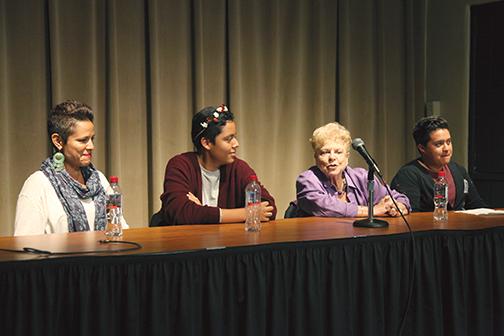Last Thursday, the National Coming Out Day and SafeZones@SDSU 5th Anniversary celebration was held at Scripps Cottage on campus.
National Coming Out Day is held around the country to encourage students to embrace their lesbian, gay, bisexual, transgender and/or queer identities.
San Diego State’s campus event included four panelists who shared their experiences coming out to their community and the reactions they received.
One panelist was former SDSU professor Oliva Espin, who told her tale of coming out at age 30 and her experience with religion. During the panel, Espin described what being in the closet felt like. She said people who are in the closet are not able to discuss issues freely because they tend to think others wouldn’t understand.
SDSU President Elliot Hirshman, SDSU Provost Nancy Marlin and President of SafeZones@SDSU Organization El Glasheen also spoke at the event.
“In the time I’ve been here, things have gotten better in smaller ways,” Glasheen said. “The main push for change happened before I came to State, but we’ve been able to build on that.”
Spanish sophomore and Queer Student Union High School Conference Chair Natalie Selemme and linguistics and Native American studies sophomore and QSU High School Conference Assistant Chair Mechelle Negrete tabled outside Scripps Cottage.
Negrete said she is excited for the upcoming Pride Resource Center—an LGBTQ and ally resource center—to open next spring and to continue to work with SafeZones and other clubs on campus.
“QSU, along with SafeZones, allows students to find a community where everyone is accepted and people have the same stories,” Selemme said.
SafeZones co-chairs Susan Cayleff, professor of women’s studies and Assistant Intern Training Coordinator at SDSU Counseling and Psychological Services Carrie Sakai found an interest in Safe Zones because of previous harassment issues experienced on campus. One incident included a case in which objects were thrown at students promoting gay marriage. Cayleff and Sakai noticed a positive atmosphere for LGBTQ, but one that was not a major commitment on campus. Students seemed willing to make campus friendlier for the LGBTQ community, but there was no way for them to actually do it, Cayleff said.
SafeZones’ mission is to assure a campus atmosphere that is welcoming, informative, educational and safe for all LGBT, queer, questioning and ally students, faculty, staff, administrators and members of the campus community, Cayleff said.
Cayleff said SafeZones is made up of two parts: ally training and social justice. Students can become allies to the LGBTQ community by taking a three-hour training course to “pursue a betterment of life,” she said.
“It’s a huge eye-opener for everyone taking the class,” Cayleff said. She said allies can help guide students to resources, answer questions and provide support for LGBTQ students.
Cayleff said students and faculty learn listening skills, role play and understand discrimination at a hands-on level. So far SafeZones@SDSU has trained more than 600 allies and has hosted 12 training sessions to specific groups on campus.
“The reason allies are so important is that they can be recognized on campus,” said Cayleff. “Teachers and students receive pins, stickers and signs to show their support. This way, students new to campus or looking for fellow LGBTQ students can simply look for the SafeZone symbol on backpacks or office doors.”
According to Campus Pride, an online community that rates colleges based on their LGBT campus, SDSU has a 5-star LGBT-Friendly Campus Climate Index. By creating such an impact in only five years, SafeZones@SDSU has broadened its goals further than campus conflict.
“We are becoming a model nationwide,” Cayleff said. “We’re helping schools in Utah and Maine, and are even establishing ourselves internationally in South Africa and Colombia.”
SDSU is providing these schools with knowledge of the ally program and opportunities that have worked here.
Photo by Monica Linzmeier, Photo Editor










